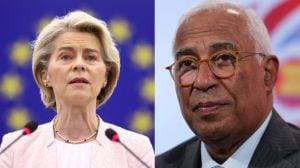Let’s involve institutions like World Bank, IMF in climate decision-making: Brazil
Conversation on climate needs to be mainstreamed in other multilateral forums, says COP30 president-designate Andre Aranha Correa do Lago
 "It is important that institutions like World Bank, IMF and others are involved. We have to expand this discussion on climate change to other multilateral structures,” Correa do Lago said.
"It is important that institutions like World Bank, IMF and others are involved. We have to expand this discussion on climate change to other multilateral structures,” Correa do Lago said.With the current process of decision-making on climate change unable to deliver effective results, Brazil, the host of this year’s climate conference COP30, has argued that the conversation on climate needs to be mainstreamed in other multilateral forums, including other UN agencies and financial institutions, for better implementation of international climate actions.
Speaking in New Delhi, COP30 president-designate Andre Aranha Correa do Lago emphasised that Brazil was not trying to undermine the 2015 Paris Agreement or the UN Framework Convention on Climate Change (UNFCCC) by attempting to expand climate discussions to other forums.
“Quite the opposite, in fact. We strongly believe that the Paris Agreement is a success. But the Paris Agreement and the UNFCCC on their own are unable to ensure the implementation of the decisions that are taken. For example, most of the solutions to fighting climate change happen to be economic solutions, involving changes in global economy. It is important that institutions like World Bank, IMF and others are involved. We have to expand this discussion on climate change to other multilateral structures,” Correa do Lago said.
The Brazilian diplomat was in New Delhi to hold consultations with the Indian government on the agenda and possible outcomes for COP30, which is scheduled to be held in the Brazilian city of Belem from November 10 to 21.
Correa do Lago, a former Brazilian ambassador to India, is on his first international visit after being designated as COP30 president. He held discussions with Foreign Minister S Jaishankar, among others.
With the United States having pulled out of the Paris Agreement and Europe preoccupied with dealing with the fallout of the Russia-Ukraine war and the sudden American antagonism towards it, Brazil is fighting an uphill battle to keep climate on top of the global agenda and deliver something meaningful from the conference it is hosting.
It has stressed that one of its top priorities would be to ensure that the multilateral process on climate change is strengthened and the example of the United States is not emulated by any other country.
“We notice that nationalist sentiments are growing in many countries. Let’s have space for nationalism inside countries, but let’s try to keep multilateralism (alive) at the international level,” he said.
Brazil has also proposed the idea of a Climate Change Council, hosted within the UN, to coordinate and coalesce all the international efforts being made on climate change and ensure more efficient results.
“Right now, lots of things are being done by lots of organisations, but there is no overarching agency to streamline all of this. That is why President (Luiz Inácio) Lula (da Silva) has proposed this idea of a Climate Change Council within the UN,” Correa do Lago said.
His comments echoed those of Brazilian Minister of Environment and Climate Marina Silva, who, during her visit to New Delhi two weeks ago, had also called for setting up of “additional” multilateral mechanisms to complement the efforts of Paris Agreement and UNFCCC.
“For over 30 years (of climate change negotiations), there have been commitments that have not been fulfilled… It is important, this issue of reforming the global governance. President Lula of Brazil has mentioned this a few times. It is important for the UN system to be more effective,” Silva had said.
“The idea is to propose this discussion on (building) structures that could be complementary to the (UNFCCC) process to follow up on the commitments that have been made. Of course, we understand that countries are sovereign, they establish their own climate commitments, construct and develop their own climate action plans. They have this independence, which is one of the main principles of the UN process. However, we feel that there may be additional mechanisms or structures to monitor (the commitments) and go beyond what we already have (in terms of monitoring),” she had said.
Correa do Lago also said it was time for countries in the Global South, like India and Brazil, to seize the leadership on climate change and chart out new paths of development.
He said he was not suggesting developing countries of the Global South should take on the additional burden of climate action, but only to incorporate climate change in their economic development plans in such a way that it becomes an example for the developed countries that have not been fulfilling their climate obligations.
“…The burden shifting that some developed countries are trying to do is really strange. Because, if the developed countries had fulfilled their obligations under the Paris Agreement, and then had been inviting other countries to also join in and contribute to their effort, that would, maybe, have been understandable. But when they have not fulfilled their part, and then call on the others to substitute for them, then this should not even be taken into consideration,” he said.
He offered the example of Brazil’s climate action plan for 2035, which, he said, was actually an economic development plan, which integrated climate action.
“It is a document designed to promote sustainable development and attract climate-friendly investment. It is a document that can be used by the World Bank or the IMF for planning development projects in other developing countries,” he said.



- 01
- 02
- 03
- 04
- 05




























